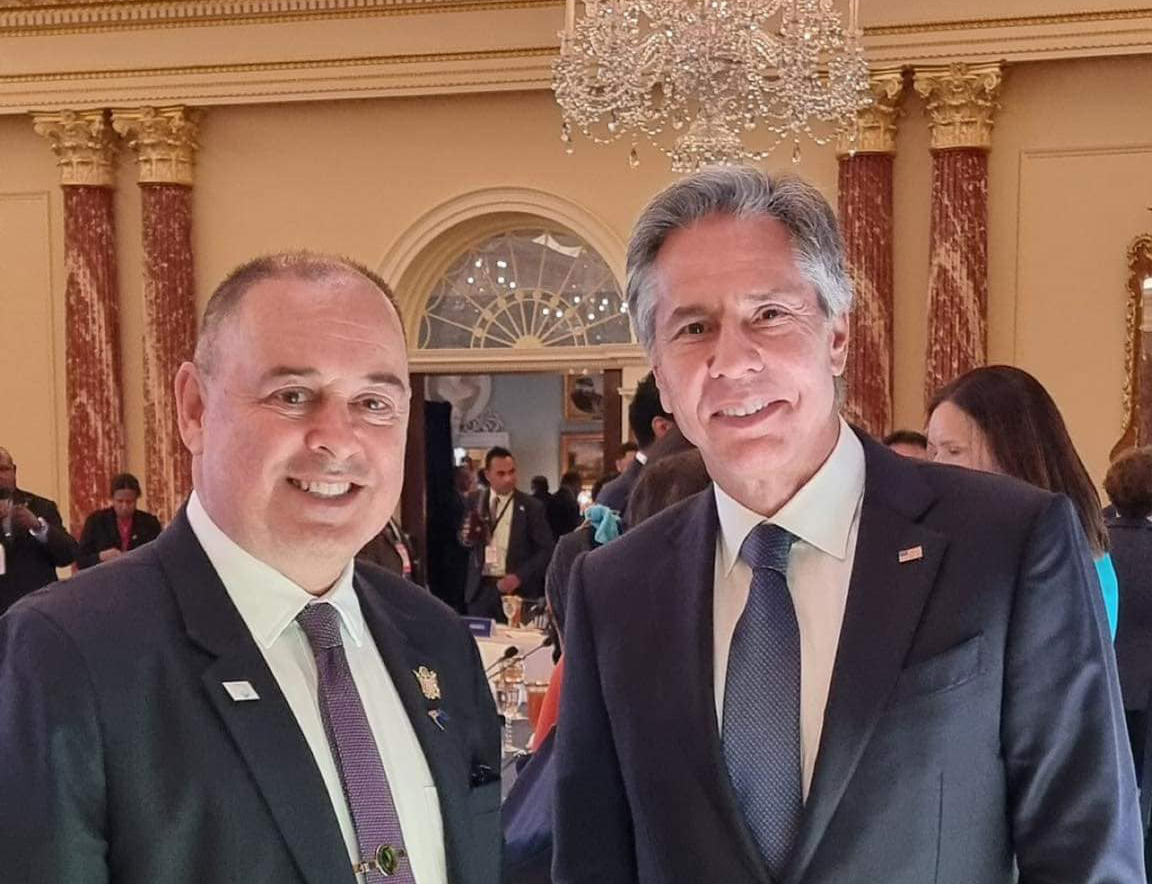United States to recognise Cook Islands as a sovereign state
Thursday 29 September 2022 | Written by Rashneel Kumar | Published in National, Politics

Prime Minister Mark Brown with U.S. Secretary of State Anthony Blinken. MFAI/22092818
The United States has committed to recognising Cook Islands as a sovereign state alongside Niue, “following appropriate consultations”.
This was announced after day one of the first-ever United States-Pacific Island Country Summit yesterday. Prime Minister Mark Brown is attending the summit alongside leaders from other Pacific island nations.
Cook Islands was not among the original 12 Pacific Islands countries announced to attend the summit. PM Brown last week accepted an invitation from United States President Joseph Biden, Ministry of Foreign Affairs and Immigration said the invitation came after months of high-level engagements between Cook Islands and US officials.
A fact sheet on the Roadmap for a 21st-Century U.S.-Pacific Island Partnership said the United States has directly provided over US$1.5 billion to support the Pacific Islands over the past decade and announced over US$810 million in additional expanded programmes.
These initiatives seek to improve the lives and wellbeing of all Pacific Islanders by expanding diplomatic engagement, including through the historic announcement that the United States will recognise Cook Islands and Niue, following appropriate consultations, it said.
Combatting the climate crisis, launching a new Trade and Investment Dialogue, providing development assistance, enhancing maritime security, expanding educational opportunities, enhancing security, health, and digital capacity, and addressing painful legacies of war were other commitments the United States made to the Pacific island leaders attending the summit.
Secretary of Foreign Affairs and Immigration, Tepaeru Herrmann earlier said: “Full participation by Prime Minister Brown in this inaugural U.S.-Pacific Island Country Summit is testament to many hours of dialogue between diplomats of both governments over many years but particularly over the last couple of months.”
“Off the back of months sustained high level engagements with U.S. officials, this direct engagement opportunity between Prime Minister Brown and President Biden during this week’s Summit in Washington is our best opportunity yet to elevate and expand bilateral co-operation with the U.S.
“There exists a solid foundation of successful oceans co-operation which we’ve built with the U.S. over decades – through bilateral and regional engagement. A commitment between Prime Minister Brown and President Biden to formalising diplomatic relations would immediately open a plethora of further growth opportunities in maritime security, fisheries, deep sea minerals, tourism, trade, health, education as well as collaboration in the multilateral sphere.
“It would also ensure the Cook Islands, on its assumption of the PIF (Pacific Islands Forum) Chair role later this year, could fully engage with the U.S. who is a dialogue partner of the PIF, to work collaboratively on supporting the region’s 2050 Strategy for the Blue Pacific Continent.”
United States President Joe Biden also unveiled the first-ever Pacific Partnership Strategy early today. The objectives of the Strategy include a strong U.S.-Pacific Islands Partnership, a united Pacific Islands region connected with the world, a resilient Pacific Islands region prepared for the climate crisis and other 21st-century challenges, and empowered and prosperous Pacific Islanders.
To achieve the four objectives, the United States seeks to partner with the Pacific Islands along the following lines of effort:
- Fulfill and increase U.S. commitments to the Pacific
- Build U.S. capacity to support the Pacific
- Bolster Pacific regional institutions and elevate the Pacific in the regional architecture
- Coordinate with allies and partners, within and beyond the region
- Combat the climate crisis and build climate resilience in the Pacific
- Support marine conservation, maritime security, and sovereign rights
- Support good governance and the human rights of all people
- Create economic opportunities and forge connectivity
- Bolster health architecture to promote health security
- Partner with Pacific Islanders to strengthen people-to-people ties and seize 21st-century opportunities.














































